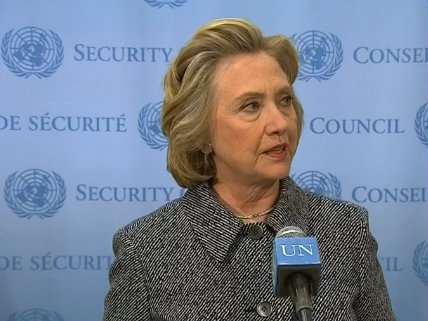Clinton Email Statement Clarifies That She Still Has Trouble With the Truth
The Democratic nominee attempts to clarify a false statement about a misleading claim.

Last weekend, Democratic presidential nominee falsely claimed that FBI Director James Comey had declared her public statements about her use of a private email account while serving as Secretary of State to be truthful. As Reason's Jacob Sullum wrote, that statement was itself not truthful. Washington Post Fact Checker Glenn Kessler gave Clinton's statement four Pinocchios, and further cited her for repeating the claim after it had been debunked.
It was typical of Clinton: Not only were her initial statements misleading, so was her attempt to explain those statements.
Today, Clinton attempted to excuse her claims by saying that "she may have short-circuited" and would attempt to "clarify" further. Her clarification of her clarification does not do much to clarify the matter.
Clinton's clarification consisted in part of noting that many of the classified emails that were sent over her privately run email server were not marked as such, and no one could have been expected to know that they were classified. Via CBS News, here is Clinton's phrasing:
"Director Comey said that only three out of 30,000 [emails] had anything resembling classified markers. What does that mean? Usually if any of you have ever served in the government, a classified document has a big heading on the top which makes very clear what the classification is. And in questioning, Director Comey made the point that the three emails out of the 30,000 did not have the appropriate markings. It was therefore reasonable to conclude that anyone including myself would have not suspected that they were classified."
Clinton is leaning hard on the notion that she could not have reasonably been expected to know that the unmarked emails sent through her system were classified, and, presumably, that she therefore deserves a pass on her behavior. Basically, she says that she made a mistake but that she could not have been expected to act differently given the circumstances.
That does not quite line up with what FBI Director James Comey concluded in his lengthy July statement following the agency's investigation into Clinton's email practices. While it is true that many of the classified emails that passed through Clinton's private email system were not marked classified, Comey said, "even if information is not marked 'classified' in an e-mail, participants who know or should know that the subject matter is classified are still obligated to protect it."
In addition, Comey noted the existence of several email chains concerning matters classified as Top Secret or Special Access Program. And he specifically said that the evidence the FBI found supports the notion that Clinton should have known better than to hold those conversations on her unsecure, private email account.
"These [classified] chains involved Secretary Clinton both sending e-mails about those matters and receiving e-mails from others about the same matters," Comey said. "There is evidence to support a conclusion that any reasonable person in Secretary Clinton's position, or in the position of those government employees with whom she was corresponding about these matters, should have known that an unclassified system was no place for that conversation."
Clinton's wants us to believe she was essentially truthful and that her email practices were mistaken but reasonable. That position is at odds with Comey's assertion that Clinton's behavior was "extremely careless" and that any reasonable person in her position "should have known" better than to converse about classified information as she did. Clinton's statement today is less a clarification of her previous statement and more a confirmation that she still has trouble with the truth.


Show Comments (359)